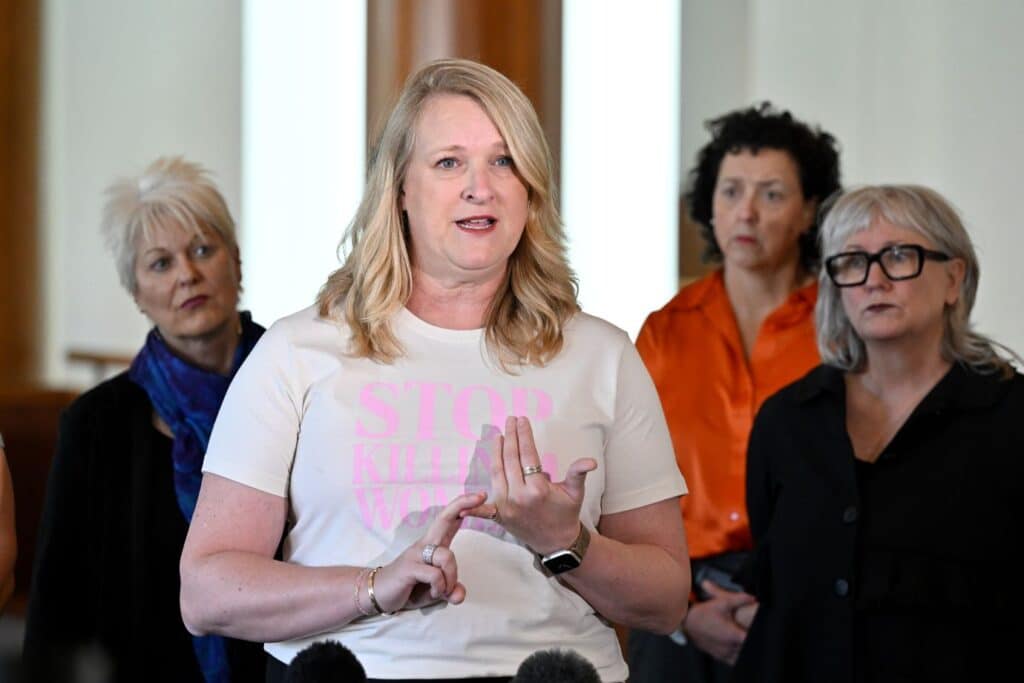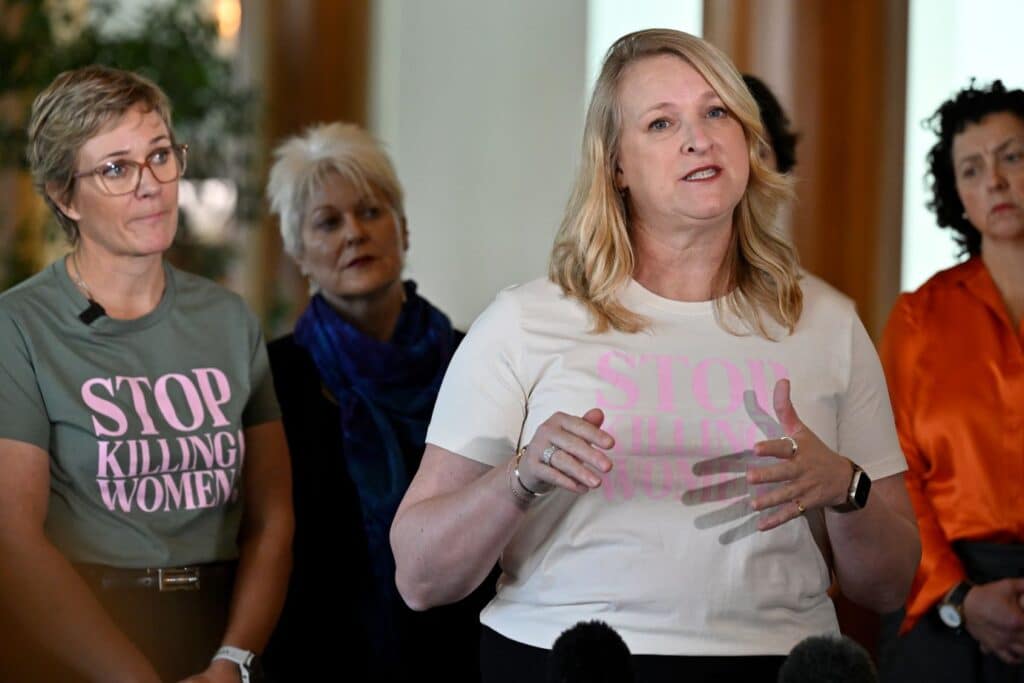Technology-facilitated abuse is quickly becoming one of the most insidious and fastest growing forms of domestic and family violence.
Last month, the NSW Crime Commission released findings that showed one in four people who have purchased GPS tracking devices since 2023 have a history of domestic violence.
Meanwhile, 99.3 per cent of people presenting to domestic violence shelters have experienced technology-facilitated stalking and abuse.
For experts, frontline workers and advocates, it’s one of the most pressing challenges facing the domestic and family violence sector.
Independent MP for North Sydney Kylea Tink held a roundtable on the topic on Tuesday, bringing together 40 frontline workers, service providers, researchers, advocates, peak bodies, and public sector leaders.
Speaking to Women’s Agenda after the roundtable, Tink said she is concerned that the issue of technology-facilitated abuse very rarely gets raised.
“Yet it’s the fastest growing kind of abuse in our country at the moment,” Tink said. “It’s insidious and the truth of the matter is that I can foresee – and I think many people working in this area predict – that this is going to become increasingly prevalent as younger generations age.”
“They are of a generation where they’re actually quite used to sharing their location with all their friends all the time. They don’t see it as a measure of control and yet we know that 99 per cent of people who are showing up at domestic violence facilities across the country have have technology-facilitated abuse as part of their experience.”

CEO of Mary’s House Services, Yvette Vignando told Women’s Agenda that the rate at which technology is being used by perpetrators to control and stalk victims of domestic and family is “exponentially on the rise”.
“Any form of tracking device or tracking based technology is relatively inexpensive to access, and you don’t need to be a technical genius to use it,” she said.
“It’s pretty much present in every client’s matter that we see [at Mary’s House Services] where there’s a coercive and controlling element.”
Vignando explained that many of the clients at Mary’s House Services feel a sense of paranoia about the number of ways they are being tracked by their perpetrator.
“It makes a woman doubt her gut instinct,” Vignando says. “Often she’ll come across as overly paranoid about being tracked and stalked, and she has every right to feel that way, because, in fact, what is happening is that her and her children’s movements have been tracked, and then the perpetrator continues to use that control to make her feel that he’s watching her every move.”
“As a frontline worker, we are looking at ways to help a woman recover. Her safety is number one, but then also recovering from the trauma of her experience, and part of that is the psychological trauma of feeling that you’re being tracked and watched, and your children are being tracked and watched.”
Co-founder of Nansen Digital Forensic Services and former detective, Rose Macdonald works with victim-survivors of technology-facilitated abuse within domestic violence, conducting digital safety audits.
McDonald said while they do see a small percentage of spyware being used by perpetrators, it’s much more common to see legitimate tools that are available within everyday devices and online environments.
“We’re working daily with victim-survivors who are concerned that either their devices, online accounts, social media or their digital presence has been compromised,” MacDonald says.
What can we do?
Tink said it was clear after the roundtable that education is a big part of the solution. Education is imperative for victim-survivors and perpetrators of technology-facilitated abuse, as well as the wider community, frontline service providers and professionals in the judiciary system.
“There is arguably a generation of young Australians growing up who are used to being able to monitor their friends movements on apps like Snapchat,” Tink said. “As young people move into intimate relationships…it’s important they recognise when technology-facilitated contact actually moves into that area of technology-facilitated abuse.”
Tink also said there was room for legislative reform to address some kind of technology-facilitated abuse.
“We have no law here in Australia, for example, that would prohibit someone from putting an app onto somebody else’s phone without their consent,” she said.
“We also talked about the role of businesses and broader systems in stepping into this space and exercising that duty of care. It’s about how we can flip it so that rather than the emphasis always being on the victims who’ve experienced this, we actually turn it more into that positive duty of care.”
MacDonald said Nansen works to develop the education about technology-facilited abuse with victim-survivors, but there was also scope for better education among the community and professionals in the legal system.
“We aim to give [victim-survivors] the skills and knowledge so that they can monitor their own accounts and devices into the future,” MacDonald says. “But I think that the education amongst the community, but also everybody involved in legal processes needs to have a better understanding of technology-facilitated abuse, what it is, and the different mechanisms that are used to inflict harm.”
If you or someone you know is experiencing, or at risk of experiencing, domestic, family or sexual violence, call 1800RESPECT on 1800 737 732, text 0458 737 732 or visit 1800RESPECT.org.au for online chat and video call services.
If you are concerned about your behaviour or use of violence, you can contact the Men’s Referral Service on 1300 766 491 or visit http://www.ntv.org.au.
Feeling worried or no good? No shame, no judgement, safe place to yarn. Speak to a 13YARN Crisis Supporter, call 13 92 76. This service is available 24 hours a day, 7 days a week.


